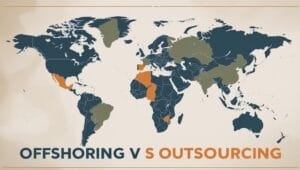Offshoring Explained: How It Works, and The Difference Between Offshoring and Outsourcing
Consider a major European fashion brand. The designs for its latest collection are born in a studio in Paris, but the garments themselves are expertly manufactured in a state-of-the-art facility in Dhaka, Bangladesh. This business practice, a cornerstone of our global economy, is known as **offshoring**.
Yet, the term is often misunderstood, confused with its close cousin “outsourcing,” and is the subject of fierce debate. This expert guide will demystify offshoring completely. We will provide a clear definition of what offshoring is in business and economics, explain how it works, clarify its critical difference from outsourcing, explore why companies do it, and analyze its complex economic and ethical impacts.
What Is Offshoring and How Does It Work?
The definition of offshoring is straightforward: **Offshoring is the relocation of a company’s business process or manufacturing facility from its home country to another country.** The absolute key word is **geography**. The work is being moved “offshore” to a foreign location.
Critically, the company still owns and manages the process. The employees in the foreign country work directly for the company.
- Example of Offshoring: A German automotive company builds its own factory in the United States to manufacture engines. The company still owns the factory, manages the operations, and the American employees work for the German parent company. This is offshoring.
- Local Example: An American retail giant establishes its own dedicated IT support and software development center in Dhaka. The Bangladeshi programmers and support staff are direct employees of the American company. This is also offshoring.
Offshoring vs. Outsourcing: The Critical Difference
This is the most common point of confusion. While the terms are often used interchangeably, they refer to two different strategic decisions:
- Offshoring answers the question: **”Where will the work be done?”** (At home or in another country?)
- Outsourcing answers the question: **”Who will do the work?”** (Our company or a third-party company?)
These two concepts can occur independently or together, creating four possible scenarios:
- Onshore Insourcing (The Default): Your company performs the work itself in its home country.
- Onshore Outsourcing: Your company hires a separate, third-party company in your *same country* to perform a task (e.g., a law firm in Dhaka hiring a local Dhaka-based marketing agency).
- Offshore Insourcing (True Offshoring): Your company performs the work itself, but at a facility it owns in a *foreign country*.
- Offshore Outsourcing (A Hybrid): Your company hires a separate, third-party company in a *foreign country* to perform a task. This is the most common scenario people think of, such as a US company hiring a call center provider in the Philippines or a ready-made garments (RMG) factory in Bangladesh. This is both offshoring AND outsourcing.
What is the opposite of offshoring? The opposite is **reshoring** or **onshoring**, which is the process of bringing business operations or manufacturing back to the company’s home country from overseas.
Why Do Companies Choose Offshoring?
Companies engage in offshoring for several strategic reasons, primarily centered around gaining a competitive advantage.
- Cost Reduction: This is the most significant driver. Offshoring to countries with lower wage levels can dramatically reduce labor costs. This is how offshoring reduces costs for manufacturing, IT support, and business process outsourcing (BPO).
- Access to Skilled Labor: Companies may offshore to tap into a large, skilled, and available talent pool. The massive, experienced workforce in Bangladesh’s RMG sector is a world-class example.
- Access to Markets or Resources: A business may build a factory in a foreign country to be closer to its raw materials or to better serve a large and growing consumer market in that region.
- Favorable Business Environment: A foreign country may offer lower corporate tax rates, fewer regulations, or direct government incentives like tax holidays within designated Export Processing Zones (EPZs).
The Economic and Productivity Impact
How does offshoring affect an industry’s productivity?
Offshoring can significantly increase a company’s productivity. By lowering the cost of production, companies can produce more goods or services for the same amount of capital investment. Furthermore, by establishing operations in different time zones, a company can create a 24/7 work cycle, increasing efficiency and speed to market.
How does offshoring impact the domestic and host economies?
- Impact on the Host Country (e.g., Bangladesh): The benefits are substantial, including massive job creation, injection of foreign investment, transfer of technology and skills, and huge boosts to GDP and export earnings.
- Impact on the Domestic Economy (e.g., USA, Europe): The effects are mixed. Consumers benefit from lower prices on goods. Companies become more profitable. However, it can lead to significant job losses in specific sectors (like manufacturing) and downward pressure on wages for low-skilled domestic workers.
What is offshoring profits?
This is a financial strategy where multinational corporations use their international subsidiaries to legally shift profits from high-tax home countries to low-tax jurisdictions or “tax havens.” This allows them to minimize their overall corporate tax burden and is a highly controversial aspect of globalization.
The Great Debate: Is Offshoring Good or Bad?
Offshoring is one of the most controversial topics in economics because its impacts are so unevenly distributed. Whether it is “good” or “bad” depends entirely on your perspective.
Why Offshoring is Controversial and Debated
The core of the controversy is a conflict of interests:
The Argument for (“Why it’s good”): From a purely economic standpoint, offshoring follows the principle of comparative advantage. It allows countries to specialize in what they do best, leading to greater global efficiency, lower prices for consumers, and economic development in poorer nations.
The Argument Against (“Why it’s bad”): From a social perspective in the home country, it can be devastating, leading to factory closures, job losses, and the decline of entire communities. Ethically, it raises serious questions about labor rights, worker safety, and environmental standards in the host country if not properly regulated. The practice of offshoring profits is also widely seen as a way for corporations to avoid their social responsibility to pay taxes in their home countries.
Is offshoring ethical or unethical? The practice itself is ethically neutral. It becomes **unethical** when it is used as a means to exploit low-wage labor, operate in unsafe working conditions, or evade environmental responsibilities. It can be **ethical** when a company invests responsibly in a host country, provides fair wages and safe conditions, and contributes positively to the local economy while delivering value to its customers.
The Role of Consulting
**Outsourcing and offshoring consulting** firms are specialized advisors that help companies navigate the immense complexity of moving a business function overseas. They provide expertise in site selection, legal and regulatory compliance, supply chain logistics, and managing the cultural and operational transition.
Conclusion: A Complex Global Reality
In summary, offshoring is a powerful strategic tool focused on **location**, while outsourcing is focused on **control**. They can be used together or separately to achieve business goals. Offshoring has been a major driver of globalization, creating a complex web of economic benefits and social challenges for both home and host countries. The ongoing debate around its merits is not just about profits and losses, but about finding a responsible balance in our deeply interconnected global economy.


